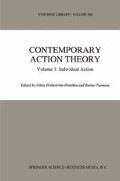Abstract
Defenders of libertarian free will are generally of the view that the sort of freedom they uphold attends most, if not all, of our decisions and actions. Exceptions, if any, are apt to be claimed only for cases of duress or compulsion, in which it might be thought that the will is somehow bowled over by the strength of a particular motive. Recently, however, Peter van Inwagen has suggested that libertarian freedom is a rare condition at best, one that can obtain only in unusual circumstances (van Inwagen 1989).1 The reason is simply that in the great majority of situations of decision and action, what to do is absolutely clear to us; and, van Inwagen argues, when this is so we cannot do otherwise. This result is disheartening, the more so since it is also a common sense belief that most operations of the will are free. If, on an incom-patibilist account of freedom, this cannot be, prospects for a convincing defense of libertarianism are considerably diminished. Accordingly, it is worth considering whether the challenge presented by van Inwagen’s argument can be met. I shall try to argue that it can.
Access this chapter
Tax calculation will be finalised at checkout
Purchases are for personal use only
Preview
Unable to display preview. Download preview PDF.
References
Brand, Myles (1984), Intending and Acting. Cambridge, Massachusetts, MIT Press.
Fischer, John Martin and Mark Ravizza (1992), “When the Will is Free” in Tomberlin (ed.), Philosophical Perspectives, 6, Ethics, pp. 423–451.
Kane, Robert (1985), Free Will and Values. Albany, State University of New York Press.
McCann, Hugh J. (1986), “Intrinsic Intentionality,” Theory and Decision 20, 247–273.
Van Inwagen, Peter (1989), “When Is the Will Free?” in James E. Tomberlin (ed.), Philosophical Perspectives 3, Philosophy of Mind and Action Theory. Atascadero, California, Ridgeview Publishing, pp. 399–422.
Van Inwagen Peter (1994), “When the Will Is Not Free,” Philosophical Studies 75, 95–113.
Author information
Authors and Affiliations
Editor information
Editors and Affiliations
Rights and permissions
Copyright information
© 1997 Springer Science+Business Media Dordrecht
About this chapter
Cite this chapter
McCann, H.J. (1997). On When the Will is Free. In: Holmström-Hintikka, G., Tuomela, R. (eds) Contemporary Action Theory Volume 1: Individual Action. Synthese Library, vol 266. Springer, Dordrecht. https://doi.org/10.1007/978-94-017-0439-7_12
Download citation
DOI: https://doi.org/10.1007/978-94-017-0439-7_12
Publisher Name: Springer, Dordrecht
Print ISBN: 978-90-481-4914-8
Online ISBN: 978-94-017-0439-7
eBook Packages: Springer Book Archive

